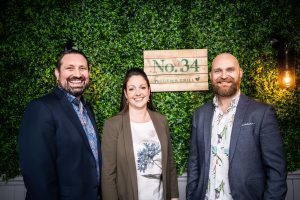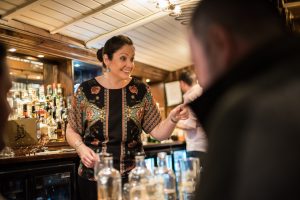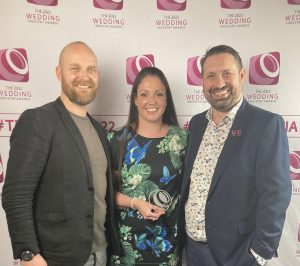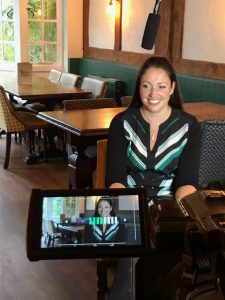International Women’s Day – Breaking the Bias
A conversation with Julie Crump, Chief Operations Officer at Caviar & Chips
Julie has been COO at Caviar & Chips since 2019 and has seen the business grow from a team of six to a team of almost 100 in just three short years. Julie has helped navigate the hospitality group through a global pandemic, two new pub / restaurant openings, a grade II listed building renovation to a boutique wedding venue and more recently being awarded the Best Wedding Caterer in the UK.

We caught up with Julie over coffee in the week that the latest venture in the group opens – No.34 Garden & Grill in Warwick. We sat in the middle of refurbishment with drills, hammers and calamity around us, but this is what Julie loves best about hospitality! We discussed all things International Women’s Day as Julie shared her story of working her way through breaking the bias.

What does International Women’s Day mean to you?
For me International Women’s Day is about celebrating each other and all of our successes, whatever they may be. It’s not just about goals we’ve achieved or the profile we have. It could be about being a great mum, a great friend and in the work place a great colleague.
I find it a bit sad that we have days like International Women’s Day if I’m honest, but for the reason that it’s a shame it has to exist. We’re all striving for equality and campaigns like this do wonderful things to breakdown this inequality. I just wish we didn’t need to in the first place.
Tell us a little about the women that have inspired you.
Growing up my Mum and both Grandmother’s have all been wonderful role models in my life. As the younger of two girls, I always looked up to my sister too. Both of my Grandmothers were separated from their wider families from a young age, and grew into really strong, independent women – they were survivors, but always so nurturing and caring. I think seeing and hearing their stories made me want to be quite independent and stand on my own two feet, but always with a sense of caring for those around me. My Mum and Grandmas were big characters in shaping me. I want to make them proud and I know whatever I do they will be proud of me, but I still want to keep trying for them.
How did you become a leader?
I didn’t wake up one day and decide to get a job and be a leader, but I knew I always wanted to be independent and be able to do things for myself. I had my first job at 15 and started earning money at a pasty and bread shop. It gave me responsibility before I realised I was looking for it! I remember working at 16 and they said to me that I seemed trustworthy so I could lock-up. I was given keys to a business and just got on with it. I wasn’t trying to be a key-holder, I just wanted to do my job well – I’ve always taken great pride in my work.
I guess I have an inner-curiosity. I did a degree in Operations Management at Lancaster University. I didn’t know what to do growing up, but originally wanted to be an Engineer as I enjoyed science subjects. I didn’t get great career advice though and so didn’t have the right A-levels for an Engineering degree, so I just wanted to keep my options open and that led me to Operations Management. I loved the group projects element and the diversity of operations, and enjoyed the logical, analytical and pragmatic side of the skillset.
When it came to looking for jobs I still wasn’t sure, but as a group of friends we looked at graduate roles. I saw a trainee management programme for Pitcher & Piano and I thought “I like bars, I like management…I’ll be a bar manager!”.

What role did you notice gender played early on in your career?
The world of hospitality was heavily male dominated in leadership. I remember my first area manager was female and it made me think ah, I could be a bit like her, that seems possible, but it was probably 80 – 90% male. It wasn’t something that bothered me. It was certainly something I noticed, but it seemed to go with the industry. I became a General Manager quite young and mostly noticed when people would call you ‘girl’ or and they ask for the person in charge to which I have to tell them…. that’d be me!
It seems to come to when people get to that stage in life when they think about starting a family and in hospitality with it being a seven day operation, it can (as certainly was back then) just a sector that didn’t really lend itself to having a family and making work, work around children, school, weekends and pregnancy!
My feeling was that people probably left the sector when it came to starting families. It does feel that there’s been a shift and we see more female Michelin star chefs as an example. We see more female leaders and more women coming into senior positions. I think there are more people going after what they want. I think there’s greater opportunities in the industry and food and drink has come on enormously in the last 20 years in the UK. I’m not sure we’ve achieved the same level of appreciation of careers in hospitality that there are in other countries like we see in continental Europe, Australia or New Zealand, but we’re getting better.

Do you think we’re seeing change in the sector for women?
I think awareness days like International Women’s Day do make a difference. More businesses look for ways to implement change from awareness campaigns like this. I remember when I was junior in my career and being told I needed to be able to move a barrel in the cellar to be able to do my job and these barrels were heavy! I’ve seen supposedly strong men struggling to move them, but it seemed back then that a point was trying to be made of being a woman, not whether I could do a job well or not. I do think that things like this happening to me has given me a greater determination to be able to do all sorts of things and not feel unable, incapable and I wouldn’t want to be considered weak. It saddens me that still in everyday life we can be put into boxes and assumptions can be made of us by our stature, size, shape and I think society as a whole would benefit if we looked at the person inside, not just what body shape (or gender) they come in!
Does being a woman mean you have to do anything different to men in the workplace?
Generally day to day, I’m not thinking I’m a woman and therefore I need to try harder or prove anything. I do however still notice times when I’m spoken to differently – particularly by people outside of our business who see me as a woman first and I’m amazed that people make assumptions as to your roles and responsibilities.
I also notice that socially, men will communicate and break the ice over football and sport and sometimes that can feel a little alienating. It’s just something I notice that I can be aware that I’m in the minority, trying to connect with the majority, when I don’t have the same common language to connect. I can be sometimes mindful of that at the being of meetings or network events.
What do you see as some of the bias’s we need to break
There’s so many more conversations about mental health and how we feel. Often women can be seen as the emotional ones and I think this can be a bias that is still carried, but good to see dissolving.
I think the worry that some women carry about a career and having children and families is a bias that I would like to see broken. People being able to make life choices and not feeling like they’re having sacrifice things would be so transformational
The hospitality industry can be a difficult industry with it being every day of the year and often the place people come to, to socialise outside of work! Services that run all of the time can often be those that are harder to live a full and balanced life in, but I do believe it’s possible. The traditional 9am – 5pm doesn’t really exist anymore in many sectors and things like flexible working and working from home are big steps forward.

Any sound advice you’d give to the next generation of leaders?
I’m excited for the next generation of hospitality leaders. There are so many incredible businesses in our sector now and so many exciting cuisines, styles and themes coming through. There’s such a variety of roles in hospitality and there are so many different positions like marketing, HR, working with the community, sustainability, finance and so on. We really noticed during the pandemic how many people missed the world of hospitality and going out and spending time with each other and it’s wonderful seeing it start to thrive again.
Spend time in roles you enjoy. Explore. It can be a bit of a joke that people fall into hospitality, but I think taking time to see where roles can take you and be open to opportunities can be a great thing. Look for great business that focus on wellbeing, mental health and doing the right thing. The hospitality sector has a history and stigma of having unacceptable behaviours you wouldn’t see elsewhere like the classic shouty chef or working a 16 hour shift. We need to leave that in the past and evolve as a sector.
What can leaders do today to create change?
Ask lots of questions. We don’t have to be old school hospitality – whether it’s the language we use or the judgements we make. This campaign encapsulates it really well around breaking the bias. We can do that right now.